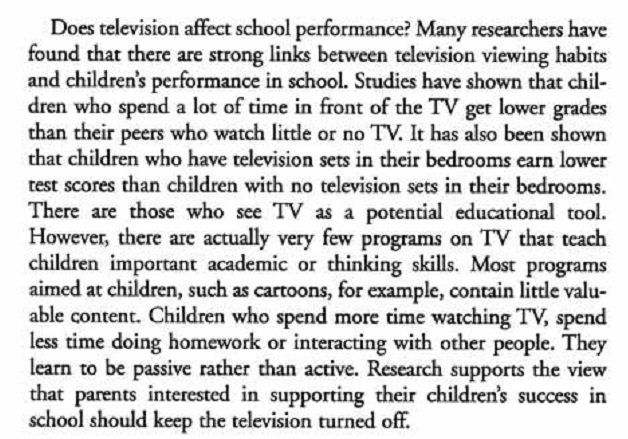Summarize the points made in the lecture, being sure to explain how they respond to the specific points made in the reading passage.
Both the professor and the writer are discussing the effects of watching television on the children's performance at school. They explain the relationship between children's grades and the number of hours spent in front of television and they suggest some solutions to enhance their grades.
First of all, the writer states that the children's performance at school is negatively affected by the number of hours they spend watching television. He affirms that they get low grades compared by those who spend fewer hours or do not watch television at all. The professor refutes this point and by giving the example of Japanese children who get high grades even though they spend more hours to watch television than their American peers.
Secondly, both the writer and the professor suggest some solutions to improve children's performance at school. The writer states that television should be used as an educational tool. Likewise, the professor agrees with this idea. Moreover, the writer proposes that parents should not allow their offspring to watch TV because it makes them passive and distract them from doing their homework, however, the professor opposes this idea and recommends that parents should choose appropriate TV programs for their youngsters and encourage them to be active by other activities such as visiting museums, zoos or playing outside.
Both the professor and the writer are discussing the effects of watching television on the children's performance at school. They explain the relationship between children's grades and the number of hours spent in front of television and they suggest some solutions to enhance their grades.
First of all, the writer states that the children's performance at school is negatively affected by the number of hours they spend watching television. He affirms that they get low grades compared by those who spend fewer hours or do not watch television at all. The professor refutes this point and by giving the example of Japanese children who get high grades even though they spend more hours to watch television than their American peers.
Secondly, both the writer and the professor suggest some solutions to improve children's performance at school. The writer states that television should be used as an educational tool. Likewise, the professor agrees with this idea. Moreover, the writer proposes that parents should not allow their offspring to watch TV because it makes them passive and distract them from doing their homework, however, the professor opposes this idea and recommends that parents should choose appropriate TV programs for their youngsters and encourage them to be active by other activities such as visiting museums, zoos or playing outside.

txt
